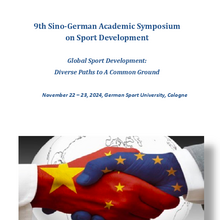9th Symposium, 22. to 23.11.2024, GSU Cologne

9th Symposium, 22-23.11.2024, GSU Cologne
The 9th Sino-German Academic Symposium on Sport Development Concludes Successfully
From November 22 to 23, 2024, the 9th Sino-German Academic Symposium on Sport Development was successfully held at the German Sport University Cologne. The forum attracted numerous scholars and industry experts from both China and Germany. Co-hosted by the German Sport University Cologne, Beijing Sport University, and the Chinese Society of Sports Science, the event was organized by the Institute of European Sport Development and Leisure Studies at the German Sport University Cologne and the Euro-China Sport Development Association e.V.
2024 is undoubtedly a landmark year for global sports, featuring the 2024 UEFA European Championship, the Paris Olympics, and the preparations for the 2025 Rhine-Ruhr Summer Universiade. These events not only capture global attention with their thrilling competitions but also spark in-depth discussions about event legacies and their long-term societal impacts.
Against this backdrop, the 5th Annual Eurasian Sport Industry Conference was held on November 18 at Emlyon Business School’s Paris campus, laying a foundation for academic exchange and sports industry collaboration. Following closely, the 9th Sino-German Academic Symposium themed “Global Sport Development: Diverse Pathways to Common Goals” focused on pressing topics such as:
- Legacies of recent Summer and Winter Olympics
- Legacies of mega-sporting events
- Applications of media and artificial intelligence in sports
- Promotion of sports participation and active lifestyles
- Key challenges in sports development and the Olympic Movement
The forum explored global sports development’s current trends while envisioning strategic international sports cooperation and sustainable development. As a vital platform for Sino-German academic dialogue, the event emphasized sports as a cultural bridge and offered valuable insights into managing event legacies and their social impacts.
Grand Opening: Collaborative Academic Exchange
The opening ceremony on November 22 was chaired by Mr. Yan Shang, Executive Vice President of the Euro-China Sport Development Association. Professors Jürgen Mittag from the German Sport University Cologne and Shengxin Li from Beijing Sport University, alongside Mr. Rui Jin, President of the Euro-China Sport Development Association, delivered warm welcome speeches on behalf of the hosts and organizers.
Panel Highlights
Panel I: The Legacy of Recent Olympic Games
- Professor Baoli Sun from Beijing Sport University shared her insights on the sustainable governance of the Beijing 2022 Winter Olympics, emphasizing the event’s tangible and intangible legacies, such as promoting winter sports and fostering social progress.
- Professor Jürgen Mittag analyzed the 2024 Paris Olympics, highlighting its innovations in venue reuse, sustainability, and social impacts, despite challenges like budget overruns.
- João Moretti from the Federal University of Paraná in Brazil examined the Rio 2016 Olympics, focusing on its legislative advancements and policy impacts on Brazil’s sports development.
Panel II: The Legacy of Mega-Sporting Events
- Professor Shengxin Li explored the evolution of Olympic sports and their influence on China’s sports industry, emphasizing a strategic balance between traditional strengths and emerging disciplines.
- Niklas Hack reflected on the Duisburg 1989 Universiade’s long-term impacts on regional sports and society.
- Professor Zeqiang Jie from Shenyang Sport University presented research on maximizing the public value of mega-sporting events through collaboration and innovative management.
Panel III: Media and Artificial Intelligence in Sports
- Dr. Joerg-Uwe Nieland and Dr. Alexis von Mirbach presented their study on sports media and women’s football, emphasizing media’s role in gender equality.
- Professor Daniel Nölleke discussed the transformation of sports journalism in the digital age.
- Dr. Renzhi Liu detailed AI’s applications in the Paris Olympics, such as dynamic data analysis, enhancing training strategies, and optimizing audience engagement.
Panel IV: Sports Participation and Active Lifestyles
- Professor Mingyi Liu from Wuhan Sport University advocated for integrating youth sports into education to address global participation gaps.
- Dr. Till Müller-Schoell presented strategies for increasing sports participation among marginalized groups through innovative practices.
- Dr. Jing Liu analyzed the social benefits of sports participation, highlighting its role in building social networks and promoting inclusivity.
Panel V: Key Challenges in Sport Development and the Olympic Movement
- Maximilian Seltmann explored elite athletes’ labor relations, advocating for better social security policies.
- Professor Zhaohong Wang from Beijing Normal University discussed the post-Olympics development of China’s ice and snow industries.
- Professor Kai Shao examined the role of sports events in urban integration, emphasizing their potential to drive sustainable development.
Cultural and Academic Exchange: A Dual Experience
Beyond the academic sessions, attendees visited two cultural landmarks: the Engels-Haus in Wuppertal and the German Sport & Olympia Museum in Cologne. These visits enriched participants’ understanding of Germany’s cultural and sports history, highlighting the interplay between historical legacy and modern sports.
A Promising Future for Sino-German Sports Collaboration
The forum concluded on November 23 with closing remarks from Professor Jürgen Mittag and Professor Shengxin Li, who emphasized the forum’s success in fostering meaningful dialogue and international collaboration. The event set a benchmark for future academic exchanges and partnerships in global sports development.
The 9th Sino-German Academic Symposium on Sport Development laid the foundation for a new chapter in Sino-German cooperation and provided a model for multilateral academic exchange in sports.